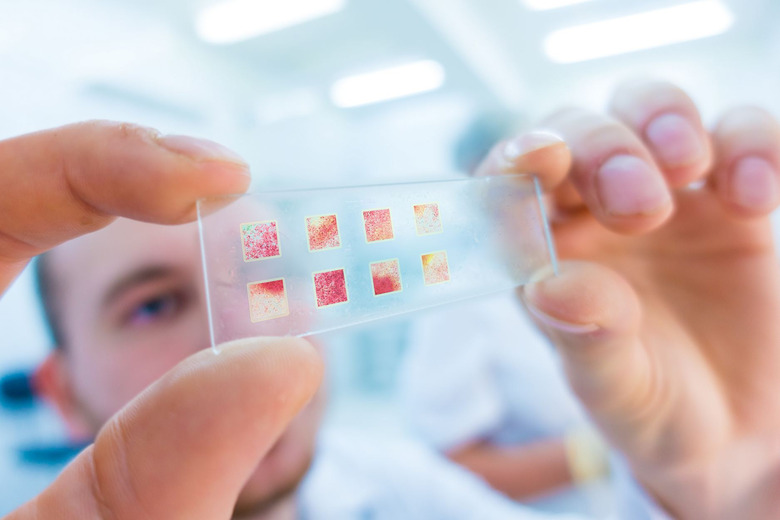Why Is Diffusion Important To The Life Of A Cell?
A cell's surrounding plasma membrane acts as a barrier to most molecules, especially those that are dangerous to the life of the cell. The membrane allows passage of beneficial materials by the process of diffusion. The evolution of cellular diffusion allows cells to cordon themselves off from and differentially interact with their immediate environment.
Importance
Importance
In order to conduct the day-to-day activities of daily life, all cells must transfer essential ions and small molecules across semi-permeable plasma membranes. Ions are atoms or molecules with a net positive or negative charge. To fulfill the requirements of life, cells exchange gases, such as oxygen and carbon dioxide; excrete waste products; and take in particles of food, water and minerals. The exchange takes place between the inner cell and its surrounding extra-cellular fluid.
Cellular Membranes
Cellular Membranes
Living cells have evolved a membrane to fence off and contain its inner organic chemicals, while selectively allowing only essential atoms and simple compounds to cross back and forth. According to the standard lipid bilayer model, the fatty-acids called phospholipids and glycolipids are the main components of cellular membranes. Other elements of the membranes are cholesterol, proteins and carbohydrates. The lipid bilayer is impermeable to most cations, or negative ions, and anions, or positive ions.
Diffusion
Diffusion
Diffusion is a process where molecules and ions move naturally from an intracellular region of high concentration to an area of lower concentration, or vice versa. Diffusion occurs spontaneously without the expenditure of energy by the cell in a procedure known as passive transport. The molecules migrate across the cellular concentration gradient until a state of equilibrium is reached. Osmosis is a type of diffusion involving the passage of water into and out of the cell.
Active Transport
Active Transport
Cells expend energy to actively transport molecules against the relative concentration gradient. Active transport, or facilitated diffusion, forces ions and molecules through the cell's membrane. The nucleotide adenosine triphosphate, or ATP, is the cell's standard energy currency enabling the process. Nucleotides are a type of nucleic acid. Large, complex, non-lipid soluble molecules, such as glucose sugars and proteins, are moved by active transport systems. The systems maintain osmotic balance and prevent the cell from exploding by taking in too much water.
Cite This Article
MLA
Whitmer, Phil. "Why Is Diffusion Important To The Life Of A Cell?" sciencing.com, https://www.sciencing.com/diffusion-important-life-cell-8759126/. 13 March 2018.
APA
Whitmer, Phil. (2018, March 13). Why Is Diffusion Important To The Life Of A Cell?. sciencing.com. Retrieved from https://www.sciencing.com/diffusion-important-life-cell-8759126/
Chicago
Whitmer, Phil. Why Is Diffusion Important To The Life Of A Cell? last modified March 24, 2022. https://www.sciencing.com/diffusion-important-life-cell-8759126/
